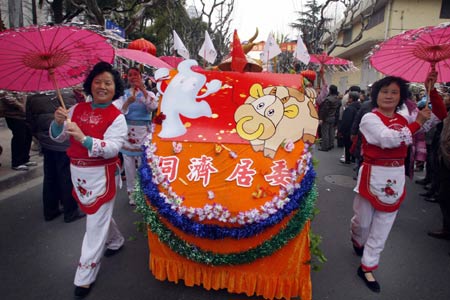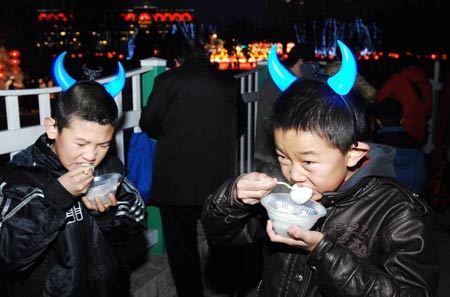In the Taer Monastery in Qinghai, more than 40 monks made Ghee flowers to celebrate the festival. Exhibition of ghee flowers, which the monastery was famous for, was held every year for the Lantern Festival.
The theme this year was the life story of Tsongkhapa, founder of the Geluk school, or the largest one of Tibetan Buddhism.
|

|
|
Local residents parade with a self-made colorful float on the Siping Street, Yangpu District, east China's Shanghai, Feb. 7, 2009. [Xinhua/Zhang Haifeng]
|
Similarly, in Shanghai, flowers were also used for Lantern Festival celebration, but these were real.
More than 150 plants with their names carrying the character "Deng" or "lantern" were exhibited in the Shanghai arboretum, some even with their shape resembling a lamp.
Lantern Festival, which fell on the fifteenth day of the first month in China's lunar calendar, was seen as end of the Spring Festival.
During the festival, people, especially children, go out at night carrying paper lanterns and solve riddles on the lanterns. Young ladies who normally stayed at home were chaperoned in the streets in the hope of finding love.
According to Wu Bing'an, a professor of Folklore, 17 ethnic groups, including Han, Mongolian, Korean, Hui, Tibetan, and Manchu, had the tradition to celebrate the festival.
|

|
|
Two kids enjoy rice balls in a Lantern Festival catering activity held in Dalian, a coastal city of northeast China's Liaoning Province, Feb. 7, 2009. Over 1,000 visitors ate rice balls together at the Laodong Park in Dalian on Saturday. It is a tradition for the Chinese to eat rice balls in celebrating the Lantern Festival, which falls on the 15th day of the first month of the Chinese lunar calendar, Feb. 9 this year. [Xinhua/Liu Debin]
|
The Lantern Festival came into the list of China's intangible cultural heritage last year.
At the end of 2007 China rescheduled its national legal holidays, adding three traditional Chinese festivals, including the "Tomb-Sweeping Day," "Dragon Boat Festival" and "Mid-Autumn Festival," as legal holidays.
Hence many advocated that people should enjoy a day off work during the Lantern Festival as well.
"In the past Lantern Festival was a carnival. It is close to the Spring Festival and people are still in the atmosphere and mood of celebration," said Liu Xuebin, curator of the Jinan folk art museum of Shandong province. "No matter judged from its history or the current situation, the day deserves to be a legal holiday," he said.
Li Yunzheng, a folk artist in Xi'an, capital of Shaanxi province, believed that "making traditional festivals legal holidays could help rejuvenating ancient culture". While Feng Jicai, president of the China Folklore Society, is also for the appeal.
(Xinhua News Agency February 9, 2009)